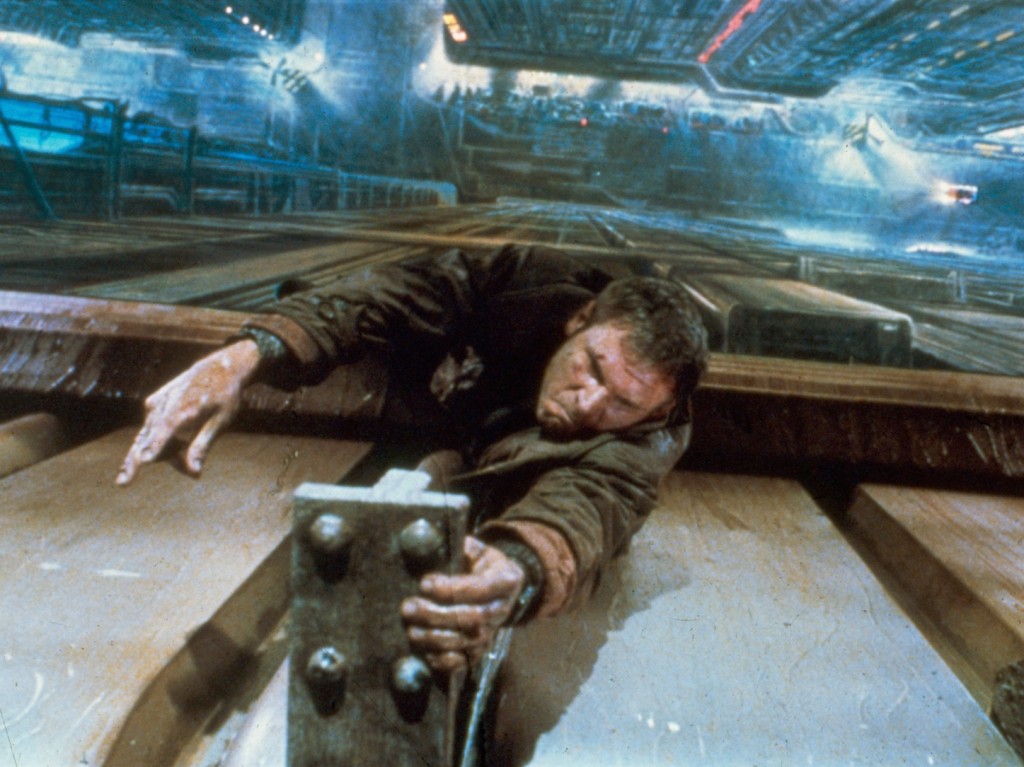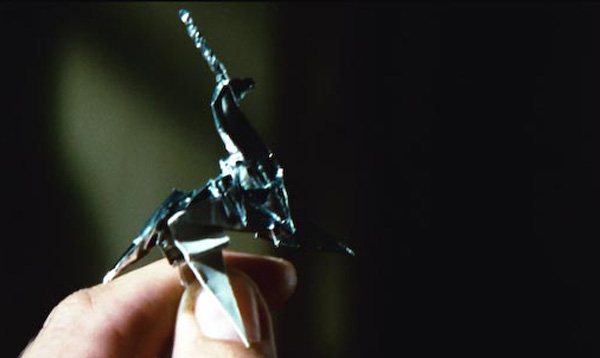Last month saw the BFI’s nationwide cinema release of Blade Runner: The Final Cut, Ridley Scott’s definitive edit of his 1982 SF-noir classic about an ex-policeman tracking down rogue androids (called “replicants”) in a near-future Los Angeles. As well as putting Scott’s arresting visuals back on the big screen where they belong, the film’s release has reignited one of the most well-worn debates in SF fandom: the question of whether or not Deckard (Harrison Ford’s hard-bitten hero) is himself a replicant. Over the last three decades, this question has become an inescapable part of the film’s legacy, to the point where it’s difficult to have any sort of conversation about Blade Runner without bringing it up. Of course, the ambiguity over Deckard’s true nature is one of the film’s greatest strengths, but that hasn’t stopped critics and fans alike from trying to settle upon a definitive answer to the question, and the way they go about this usually involves totting up the opinions of people involved in the production of Blade Runner, an example of what the TV Tropes website calls Word of God. But this is a problematic approach, especially when a creative team is as divided in its opinions of a work as Blade Runner‘s is – which is something we’ll see below. It’s also problematic for more principled reasons, as I shall argue in this article.
It’s undeniable that the film (at least in its Final Cut incarnation – more on that later) drops some pretty heavy hints that Deckard is something more (or less) than human. The discovery that replicants can be implanted with human memories, Rachel’s unanswered question to Deckard about whether he’s ever turned the Voight-Kampff test on himself, Gaff’s loaded line about doing “a man’s job” and of course the (in)famous unicorn sequence are all suggestive, but enough ambiguity remains that plenty of room is left for debate. And this debate continues to rumble on 33 years after Blade Runner‘s original theatrical release, mainly because the cast and crew themselves remain so divided on the issue, as demonstrated by Mark Kermode’s recent vlog on the topic. While Ridley Scott has appeared on camera stating definitively that Deckard is meant to be a replicant, Harrison Ford and Michael Deeley (producer) are adamant that he isn’t. Screenwriters Hampton Fancher and David Peoples are less clear-cut in their views, unable as they are to remember which of them was responsible for casting doubt on Deckard’s humanity; certainly in the story they were adapting – Philip K. Dick’s Do Androids Dream of Electric Sheep – the main character is not an android. In terms of pure numbers, then, the ‘non-replicants’ seem to have it. But fans have tended to lend far greater weight to Scott’s opinion, that Deckard himself is in fact a replicant, perhaps because in the world of cinema directors are conventionally seen as the true ‘author’ of the work. The problem here, though, is that authorial intent does not have a monopoly on a work’s meaning.
I’ve written before on this site about Barthes’ ‘Death of the Author’, but as it’s particularly relevant to this discussion, I’ll repeat the definition I gave in an earlier article:
In his landmark 1967 essay The Death of the Author, literary theorist Roland Barthes argued that authors do not have a monopoly over the meaning of any work of art they have created. Once that work is out in the public sphere, people will begin experiencing it and forming their own myriad interpretations of it, none of which, according to Barthes, is any less legitimate than the author’s intended interpretation. Another way of articulating this idea is to say that, once it is completed, a work of art exists independently from its creator.
What does this mean for our interpretation of Blade Runner, in terms of Deckard’s biological humanity or lack thereof? Put simply, it doesn’t matter what Scott, Ford et al think; the conclusions of any given viewer based on the available evidence (i.e. what’s on screen) are just as legitimate as the beliefs of the creative team. If you come away from Blade Runner believing that Deckard’s a replicant, then he’s a replicant. If not, then he’s not. In other words, there is no definitive answer to the Deckard question and never can be – the ambiguity so central to the film’s lasting appeal ensures it. Taking a poll of the film’s cast and crew will not yield such an answer, even by majority vote; it will only reveal what their individual interpretations of the movie are. Instead of asking “what does Ridley Scott think?”, anyone seeing the film should simply be asking themselves “what do I think?”.
There is a final complication, though, and it’s one that potentially opens up a rabbit hole of speculation. If we can only form judgements about meaning based on what is presented to us, questions must inevitably arise about the editing of a work. Blade Runner has been released in numerous different cuts over the last three decades, some of which do not feature key scenes held up as evidence by the “Deckard is a replicant” camp, the most notable example being the excising of the full unicorn sequence from the film’s original theatrical release cut. The Final Cut, released in cinemas last month by the BFI, is considered to be Ridley Scott’s “definitive” cut of the movie, but if this version seems to lend more weight to Scott’s own interpretation of the Deckard question, why should we consider it more legitimate than, say, the original theatrical version, re-cut as it was by the studio? Following this line of logic too far would have us constructing labyrinthine theories about our favourite films and books with only the most tenuous connections to the story available to us, and at that point, we’d be as well just to go ahead and write fan fiction. It seems to me that a measure (albeit a small one) of authorial intent must be accepted when interpreting the meaning of a work, but this intent extends only as far as the work’s editing. As such, we must form our opinions of Deckard’s (in)humanity based on Blade Runner‘s final cut, because this is the film as Ridley Scott intended it to be. Beyond that, though, nothing he (or any other ‘author’) says should sway our personal interpretations.
It’s also why we can ignore Blade Runner 2 (currently in pre-production) if it’s terrible.


